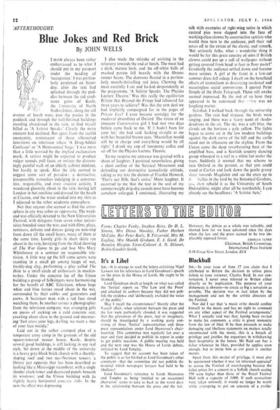It's a Libel
L. _1
L.
COQ
L
cr
From: Charles Fenby, Stephen Reiss, Dr D. L. Simms, Mrs Diane Munday, Father Herbert McCabe, Rev Peter Baelz, B. Fitzgerald, Mrs M. Eagling, Mrs Maaleh Graham, E. 1. Gard, Dr Rosalyn Higgins, Lieut.-Colonel A. N. Skinner, Robin Goodsir Smith.
SIR,-It is strange to read the letters criticising Nigel Lawson for his references to Lord Goodman's speech on the press in the House of Lords. He ought to be thanked.
Lord Goodman dwelt at length on what was called the 'Justice' report on The Law and the Press' and attacked its authors because they did not pub- lish the evidence and 'deliberately excluded the voice of the public.'
May I recall the circumstances? Shortly after the Vassall affair, when relations between the press and the law were particularly clouded, it was suggested that the grievances of the press, real or imaginary, should be investigated by a working party con- sisting of three 'Justice' representatives and three press representatives under Lord Shawcross's chair- manship. This committee met regularly for over a year and then decided to publish its report in order to get public reactions. A public meeting was held and the next step was the House of Lords debate, initiated by Lord Tangley.
To suggest that no account has been taken of the public is as far-fetched as Lord Goodman's other complaint—that the committee did not publish the material which newspaper lawyers had held to be libellous!
Lord Goodman's reference to Lords Shawcross and Tangley as being 'entitled to an occasional aberration' seems to take us back to the worst days in the relationship between the press and the law.
However, the debate as a whole was valuable, and showed how far we have advanced since the days when the law and the press seemed to be two im-
placably opposed forces. CHARLES FENBY Chairman. British Committee, International Press Institute 8-16 Great New Street, London, EC4






























 Previous page
Previous page